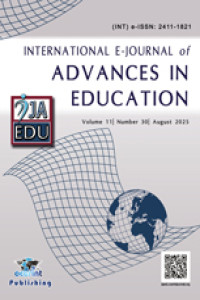INNOVATIVE APPROACHES TO ENHANCING COMMUNICATIVE COMPETENCE IN ENGLISH FOR SPECIFIC PURPOSES (ESP) CLASSES
Abstract
This research explores new methods for enhancing communicative competences in English for Specific Purposes (ESP) classes, with a particular focus on professional contexts. As global communication needs evolve, it is essential for ESP programs to adopt innovative teaching strategies that go beyond traditional language instruction to address specific communicative challenges faced by learners. This study investigates a range of modern techniques, including task-based learning, technology integration, and immersive learning experiences, to improve learners' ability to communicate effectively in specialized fields. By incorporating real-world scenarios, role-playing, and the use of digital tools, these methods aim to develop not only linguistic proficiency but also the practical, interpersonal, and cross-cultural communication skills required in professional settings. The research evaluates the effectiveness of these approaches in fostering more interactive and dynamic learning environments, enabling learners to better navigate the communication demands of their specific fields. The study offers recommendations for integrating these new methods into ESP curricula, enhancing the overall quality and impact of language education in specialized domains.
Keywords
Communicative competence ESP classes innovative teaching methods language education professional communication
References
- Godwin-Jones, R. (2018). Emerging technologies: VR and AR in language learning. Language Learning & Technology, 22(2), 1-12.
- Reinders, H., & White, C. (2011). The theory and practice of online learning. Athabasca University Press.
- Glover, I., & O’Rourke, M. (2018). Gamification and language learning: From theory to practice. Language Teaching Research, 22(3), 373-395.
- McCarthy, M., & O’Dell, F. (2008). English vocabulary in use: Advanced. Cambridge University Press.
- Boulton, A. (2010). Corpus-based language learning in ESP: A review. Journal of English for Specific Purposes, 29(4), 224-246.
- O'Keeffe, A., McCarthy, M., & Carter, R. (2007). From corpus to classroom: Language use and language teaching. Cambridge University Press.
- Robin, B. R. (2008). Digital storytelling: A powerful technology tool for the 21st century classroom. Theory into Practice, 47(3), 220-228.
- Ellis, R. (2003). Task-based language learning and teaching. Oxford University Press.
- Coyle, D., Hood, P., & Marsh, D. (2010). CLIL: Content and language integrated learning. Cambridge University Press.
- Littlewood, W. (2004). The task-based approach: Some questions and suggestions. ELT Journal, 58(4), 319-326.
Details
| Primary Language | English |
|---|---|
| Subjects | Communication Education |
| Journal Section | Research Article |
| Authors | |
| Early Pub Date | September 1, 2025 |
| Publication Date | September 10, 2025 |
| Submission Date | February 25, 2025 |
| Acceptance Date | March 23, 2025 |
| Published in Issue | Year 2025 Volume: 11 Issue: 30 |
Published and Sponsored by OCERINT International © 2015 - 2025
Contact: ijaedujournal@hotmail.com
International E-Journal of Advances in Education by IJAEDU is licensed under a Creative Commons Attribution-NonCommercial 4.0 International License. Permissions beyond the scope of this license may be available at http://ijaedu.ocerintjournals.org


